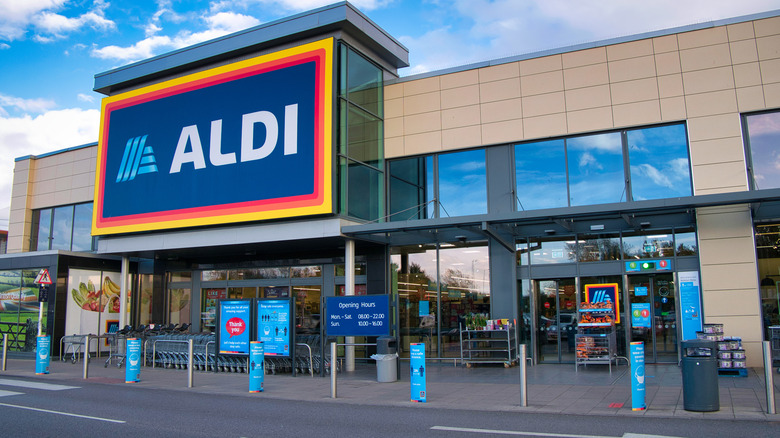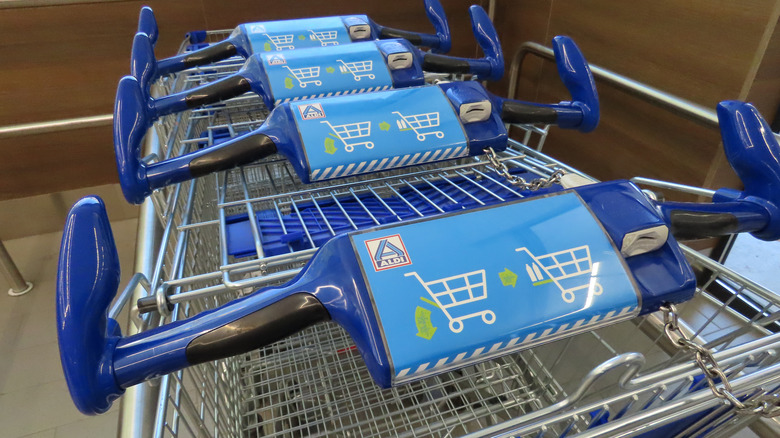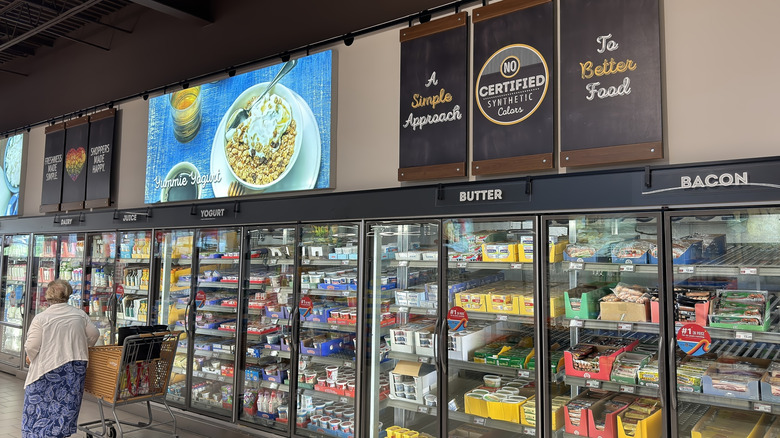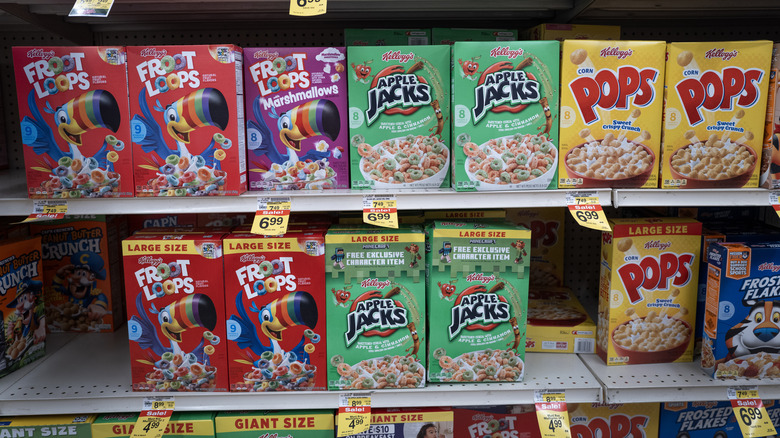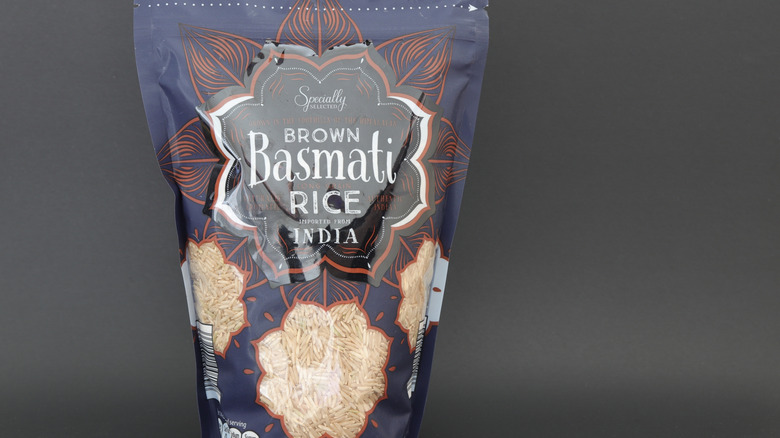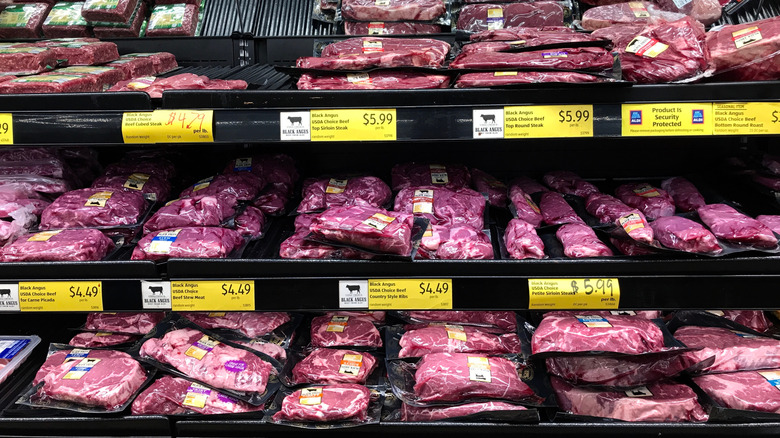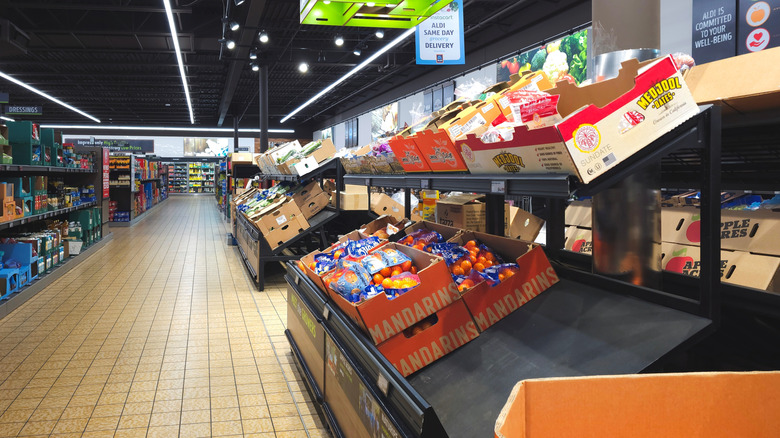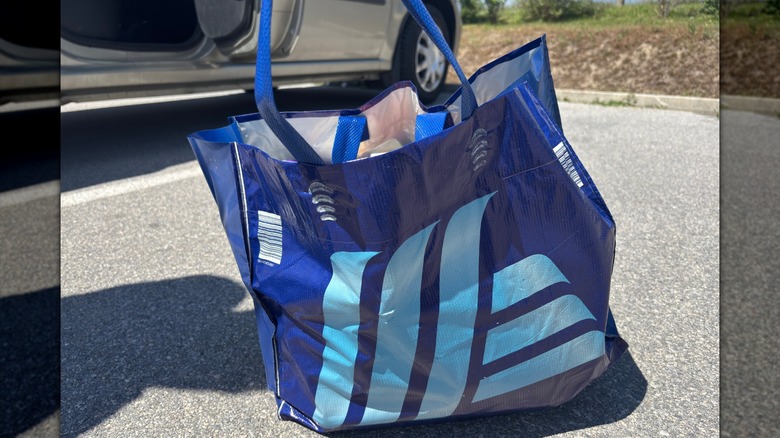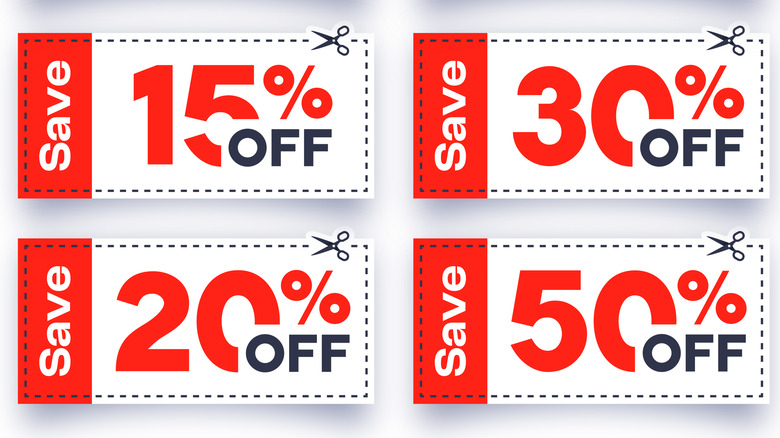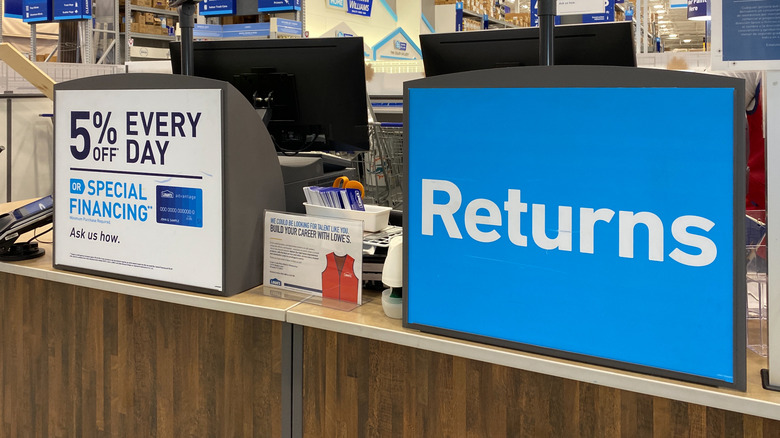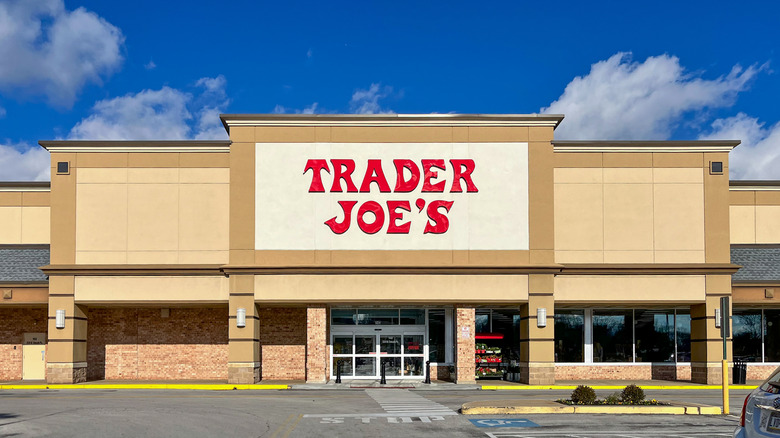14 Things You've Always Believed About Aldi (That Aren't True)
Even if you've never shopped there, you've most likely heard of Aldi. Every community seems to have one, along with a couple of regional chains. Founded by the Albrecht brothers over 40 years ago, Aldi came to the U.S. in 1976, and the discount chain has expanded from coast to coast. Odds are, you know someone who shops there and raves about the prices and quality. They may encourage you to give it a try. You probably should do so sooner rather than later, before prices climb on some essentials. Even Aldi is affected by factors that impact pricing.
If you have not yet shopped at an Aldi, you may have heard some things that are not true. Just as with anything else these days, there's a lot of misinformation floating around. Before you give it a try, you should have these myths dispelled. We are presenting 14 things you may have heard about Aldi, and we're setting the record straight. We want you to head in for your first time as a prepared customer. You'll enjoy the experience more.
1. They charge you to use a shopping cart
You may have heard that you need to pay to use a shopping cart. Although you do need a coin to get a cart, you are technically not being charged. In order to pull a cart out of the interlocking line, you must insert a quarter. This unlocks the cart, and the quarter stays in the slot. This is not a charge or a rental fee. When you return the cart to the line, the quarter pops out. So, you are just making a refundable 25-cent deposit.
You probably wonder why Aldi does this. It is part of the strategy they employ to keep prices down. At a standard supermarket, you've seen employees whose job it is to go out and gather up shopping carts and bring them back inside. They collect them from the stations provided and also from where some people just decide to leave them. Those employees are paid to do this. One of the ways Aldi uses to keep prices down is to limit staff. By having the quarter deposit, people are far more likely to return the cart to get their quarter back. This eliminates the need for cart wranglers. Someone may have told you that you can put your house key in the quarter slot if you have no change. This is not recommended. During checkout, the cashier usually puts your items into a different cart. If you forget your key in there, you could have problems.
2. Prices are low because they don't sell quality items
We've all heard the saying, "You get what you pay for." Sure, that is generally the case, and lower-priced items are often of lower quality. At Aldi, lower prices don't necessarily mean lower quality. The chain lowers its costs considerably through minimal staffing and reduced overhead. Stores are laid out efficiently, and employees perform multiple tasks. The stores are also small and very fast and easy to stock. Aldi knows how to cut costs.
In terms of quality, Aldi has a test kitchen and quite a number of its own brands. In fact, more than 90% of the products at Aldi are its own. All items are tested to meet high standards of quality. Foods and ingredients are fresh and sustainable for a healthy planet and a healthy budget for shoppers. A savvy shopper can come home with quality groceries for a fraction of the price of competitors. High quality and low prices are what Aldi strives for.
3. Aldi doesn't carry major brand names
What if you want a brand-name item? Well, for most things, you will have to go to a large supermarket chain store. That does not mean that you can't get any of these products at Aldi. The discount chain does carry some big-name products that you may want to buy. Yes, about 90% of the items are its own brands, but the other 10% include brands such as Coke, Pepsi, Gatorade, Oscar Mayer, Pampers, and others, which are available on the shelves at Aldi.
Customers on Reddit have stated that they have found many brand-name products at their local Aldi. This seems to be a trend, but it does vary by season and location. When you get familiar with your local store, you will find out what brand names are there, and how they compare price-wise to Aldi brands, or the same brands at other stores – you have options.
4. There are no organic or specialty items
Many people who are concerned with eating healthy like to buy organic foods. Specialty items are also popular for foodies, in particular. You may think that a discount supermarket chain like Aldi wouldn't carry any of these foods. You would be wrong.
One of Aldi's brands is the Specially Selected line. This brand consists of gourmet items such as meats, cheeses, coffee, jarred fruits and vegetables, syrups, bread, seafood, and many other items. Many of the products in this line are imported and very healthy and of high quality. Some are even award-winning products. Aldi's Simply Nature brand includes organic, non-GMO meats, vegetables, beverages, and other healthy items that are free from artificial ingredients and preservatives. Make sure you know how to tell if the meat you're buying has been ethically sourced. Don't let the myth of no organic food availability keep you from trying Aldi. Stop in and you may be very pleasantly surprised at what you find.
5. Aldi's meat is worth buying
Although Aldi does have grass-fed beef and organic meat, many customers prefer to get their meat elsewhere. Knowing how to choose ground beef with the perfect ratio of fat is one thing, but you also need to know the best place to buy your meat. One food blogger recommends only buying bacon, lunch meat, and pepperoni at Aldi, as the quality is good and the prices are lower than supermarkets. Aldi's other meats are good quality, but sale prices at supermarkets are generally better.
Shoppers on Reddit also state that meat prices are better at supermarkets during sales. Some have even said Aldi's meat quality is not great. You may want to check this out for yourself, but it's good to have a heads-up before you shop at Aldi. It will give you a chance to check out the prices at your local supermarkets. However, you may want to think twice before buying steak at the supermarket again.
6. It's a good idea to buy produce there
Another major category of food is produce. A healthy diet includes plenty of fruit and vegetables, and they are delicious and add variety to meals. Aldi does carry a nice variety of produce, and the prices are very competitive as well. Buying produce anywhere can be tricky. For example, you want to avoid the mistakes people make with bananas. Likewise, be aware of what you need to learn before buying fresh fruit.
Aldi does not refrigerate their stock of fresh produce like supermarkets generally do. They also put it on display in the boxes it's shipped in. As such, shoppers find that produce from Aldi does not stay fresh as long as fruits and veggies from other discount stores such as Costco and Trader Joe's. This is confirmed by comments made by shoppers on Reddit. Another issue is that some items, such as apples, potatoes, and onions, cannot be purchased separately — you have to buy an entire bag that you may not be able to use up before it spoils.
7. Aldi only sells food
Supermarkets and stores like Aldi are often thought of primarily for food. Of course, supermarkets stock many essential and useful non-food items as well. It takes more to run a household than only things you can eat. You might be surprised to find that Aldi often carries a wide variety of non-food products. Many of these items have discounted prices that make them worth checking out. You can go to the Aldi website and look at their weekly finds. It will list all the items that are currently available and their prices.
You'll find things like laundry detergent, soap, and cleaning supplies. They sometimes have clothing and housewares. You can pick up diapers and toys for your little ones, and they sometimes have furniture. Kitchen utensils, storage solutions, and bedding are other household items worth looking for at Aldi. It can add up to greater savings.
8. You have to bring your own shopping bags
You probably know that most Aldi shoppers bring their own bags. In most supermarkets, bringing your own shopping bags is highly recommended, but not necessarily required. Just like in supermarkets, Aldi seeks to cut down on waste by encouraging customers to bring reusable bags. Supermarkets still have paper bags that they charge you for, in case you forget to bring yours or make an impromptu shopping visit. Because it produces significant waste, many stores no longer use plastic bags.
If you do show up at Aldi without bags, you can purchase reusable ones from the store. It's an extra charge, but, as stated, some supermarkets charge you for paper bags and sell their brand of reusable bags too. If you bring the bags back every time you shop, it becomes a worthwhile investment. If you already have shopping bags, keep some in the car for when you visit Aldi. But, in the event you pop in without them, Aldi has you covered.
9. Groceries are bagged at the register
You are likely aware that you bag your own groceries at Aldi. This is not uncommon or difficult, as you know if you frequently use the self-checkout at a supermarket. What you may not know is that you don't bag them at the end of the belt at the register. Aldi registers all have cashiers, and as they scan each item, they place it in another shopping cart. This keeps things flowing quickly and smoothly. After you have paid, you take the cart to a separate bagging area.
Once there, you bag up your items and set them in your cart to take to your car. This saves money by Aldi not having to pay employees to bag and carry groceries for customers. It's an efficient operation, and once you get used to it, it's easy. Don't forget to bring the cart back for your quarter.
10. You can always get assistance from an employee
When you're shopping at a regular supermarket, it is usually pretty easy to find an employee to help you. There are generally people stocking shelves in the aisles, as well as manning the bakery, deli, produce, and meat sections, and the registers. As we mentioned before, Aldi stores are lightly staffed. They don't have all those departments, and very few employees are on site. It's not that you can't get help from an employee; it just may not be easy to find someone who is not too busy to assist you.
Because of its money-saving practice of minimal staffing, Aldi is not like a typical supermarket, where it is generally easy to find an employee to help you. Aldi employees usually fill multiple roles and are not always around to answer questions. Fortunately, Aldi stores are much smaller than the typical supermarket and carry far fewer items. Finding things is generally not that difficult. If you really need help, asking politely will likely result in an employee rendering assistance as soon as they are able to.
11. Aldi has similar hours to most supermarkets
Supermarkets are usually open for long stretches, which is convenient for customers. Some open as early as 7 a.m. and close at 11 p.m., often every day of the week. There are even some in large cities that are open 24 hours on certain days. You can shop before work or late at night, and schedule your visits during off-peak hours. You may assume that, as a national chain, Aldi would have similar hours — it doesn't.
As part of its cost-cutting strategy to keep prices low, Aldi stores are open during peak hours. Typically, Aldi locations open at 9 a.m. and stay open until 8 or 9 p.m. Monday through Friday. On weekends, hours are generally 9 a.m. to 7 p.m. Early morning and late night shopping are not possible, and you have less chance of shopping in a nearly empty store. However, it contributes to the savings you enjoy. It seems a reasonable trade-off for a lower grocery bill.
12. Aldi accepts coupons
Coupon searching and clipping can save you money, and has become almost a part-time job for some people. These folks are called "extreme couponers," and they base their shopping trips on when an item is at its lowest price using a coupon. They have files with coupons from stores, newspapers, and other sources. It takes up an extensive amount of time and requires a lot of work and organization. Most people just clip coupons they find for items they typically buy.
With Aldi, no coupon clipping is necessary. The store does not issue its own, nor does it accept manufacturer's coupons. If you like to use coupons, this may put you off. However, Aldi takes great pride in the fact that prices on its brands are low enough that coupons are not necessary. You can save money without spending all that time looking for, clipping, and storing coupons.
13. Aldi does not accept returns
You may have heard that since Aldi is a discount store, it does not accept returns. This can be distressing for shoppers because nobody wants to be stuck with a subpar product and wasted money. The truth about Aldi and returns is quite the opposite. Very few stores offer a return policy as good as Aldi's.
It's called the "Twice as Nice" policy, and it clearly demonstrates how the store stands behind its products. If you purchase an item from one of Aldi's brands and find a problem or are not fully satisfied with it, you just have to bring it to the store in its original packaging. Take it to a manager and you will not only get a full refund, but the store will also give you a replacement of the same product. Hence, the name, "Twice as Nice." It's another good reason to give Aldi a try.
14. The same parent company that owns Trader Joe's owns Aldi
If you are a Trader Joe's customer, you should know why it pays to shop at multiple locations to get the most benefit from the chain. You may have heard that Aldi and Trader Joe's are owned by the same parent company. This is not exactly true, but they are part of the same family. Remember the Albrecht brothers who founded Aldi way back when?
Aldi and Trader Joe's are not owned by the same company, but their parent corporations are connected. Aldi was founded by two German brothers, who in 1961 split the company into two: Aldi Nord (Aldi North) and Aldi Sud (Aldi South). Aldi Nord owns Trader Joe's, and Aldi Sud owns Aldi's U.S. stores. Apparently, at some point, the two disagreed on whether or not to sell cigarettes, and this led to them dividing their company into two separate enterprises.
Aldi Nord runs the European Aldi stores and acquired Trader Joe's in 1979. Aldi Sud still owns the Aldi stores in the U.S. Technically, they are owned by two different companies, but they are siblings, so to speak. So, by shopping at both stores, you can reap the benefits of each while keeping it in the family.
